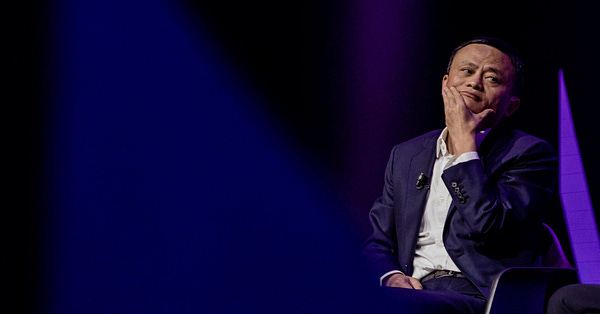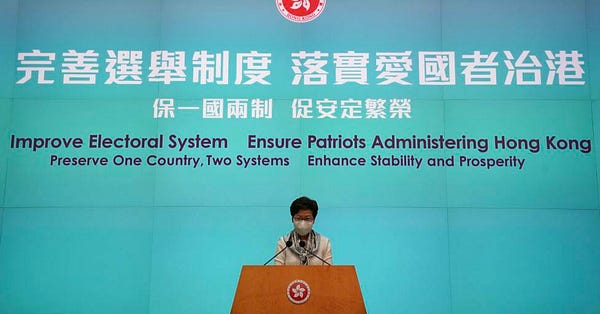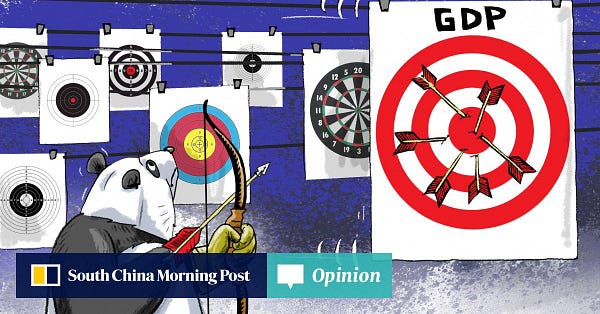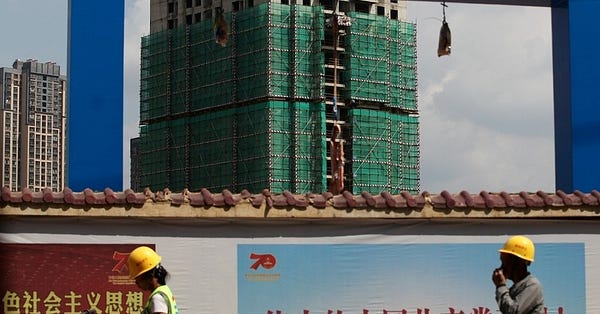Welcome to the 63rd edition of Trade War.
Regulators hit Alibaba with the largest anti-trust fine in China’s history and a university run by founder Jack Ma is forced to suspend plans to admit a new class.
Multinationals face challenges dealing with nationalist consumers and Hong Kong business elites may be losing their special status in the territory.
China struggles to overcome its planning legacy. And the Biden administration is making it easier for U.S. officials to meet with their Taiwanese counterparts.
China’s largest ever anti-trust fine: ‘a kind of love’
Regulators have slapped Alibaba with the largest anti-trust fine in China’s history; at 18.2 billion yuan, it is three times the previous record, reports the Wall Street Journal’s Keith Zhai.
“China’s State Administration for Market Regulation said Saturday in Beijing that Alibaba punished certain merchants who sold goods both on Alibaba and on rival platforms, a practice that it dubbed ‘er xuan yi’—literally, ‘choose one out of two,’” the Journal reports.
The market regulation body also mandated that Alibaba “carry out a comprehensive revamp of its operations and submit a ‘self-examination compliance report’ within the next three years.” The 18.2 billion yuan fine amounts to four percent of Alibaba’s domestic annual sales, according to the regulator, with antitrust fines not to exceed 10 percent of any company’s annual sales.
“The regulator’s punishment of Alibaba Group is a move to standardize the company’s development and set it on the right path, to purify the industry and to forcefully protect fair competition in the market,” the People’s Daily wrote in a commentary, adding that the penalty is “also a kind of love.”


Reading the tea leaves
Here is a link to the People’s Daily piece plus a tweet thread from the Journal’s Zhai, where he advises a careful reading of the party paper’s article “for anyone who wants to figure out the future” of Alibaba. [Chinese]


Alibaba’s sincerity and determination
Whether the fine signals the end to punitive actions against Alibaba or whether more are in the offing, is unclear, reports Bloomberg’s Coco Liu.
“Regulators are said for instance to be concerned about Alibaba’s ability to sway public discourse and want the company to sell some of its media assets, including the South China Morning Post, Hong Kong’s leading English-language newspaper,” Liu writes.
“Alibaba accepts the penalty with sincerity and will ensure its compliance with determination. To serve its responsibility to society, Alibaba will operate in accordance with the law with utmost diligence, continue to strengthen its compliance systems and build on growth through innovation,” an Alibaba company statement proclaimed on Saturday.

Organized entrepreneurs weakening the government?
A business university set up by Alibaba founder Jack Ma has been ordered to suspend new enrollment, reports the Financial Times.
“Hupan University, an executive training program that is reputedly as hard to get into as Harvard, has suspended a first-year class that was set to begin at the end of March, according to people close to the institution,” the Financial Times reports.
“The government thinks Hupan has the potential to organize China’s top entrepreneurs to work towards a common goal set by Jack Ma instead of the Communist party,” a person identified as close to the school, told the paper. “That cannot be allowed.”
“Some high-ranking officials in Beijing have begun to view the school as a modern-day version of the Donglin Academy, one person said. The private academy was a powerful 17th century debating ground that spawned like-minded thinkers who eventually influenced politics and weakened the Ming Dynasty government.”


If the Party doesn’t trust Jack Ma, why trust HK elites?
Hong Kong’ political and business elites, long accustomed to being treated well under both British and Chinese rule, are in for a rude awakening, writes Claremont McKenna government professor Minxin Pei in Nikkei Asia.
Rather than consult with Hong Kong’s elites over the 2019 national security law, and more recently with anti-democratic electoral reforms, Beijing has left them out and “relied mostly on its own senior officials.”
“If the party would not trust Jack Ma to run his business, it is hard to imagine that it would trust Hong Kong's elites to undertake the task of turning their city into just another party-controlled Chinese town,” writes Pei.
Meanwhile, “Chinese efforts to bring to Hong Kong its much-feared surveillance state will not just infringe on the liberties of ordinary citizens. More importantly, Hong Kong's elites will also be subject to such surveillance, since the CCP is more worried about the troublemaking potential of elites,” he writes.
“In the coming years, Hong Kong's elites will have to make a painful decision. If they don't' want to accept their marginalized status and growing insecurity, it is time to draw up a Plan B. Those still unsure may want to hear from their elders who fled the victorious Communists marching into Shanghai in 1949.”


Leniency for those who confess, severity for the rest
Multinationals are facing the growing challenge of doing business in China while not upsetting nationalist Chinese consumers and a prickly CCP, writes Isaac Stone Fish, CEO and founder of Strategy Risks.
“The old Communist maxim — “leniency for those who confess, severity for those who resist” — informs how the Party treats foreign brands today,” writes Stone Fish, citing the ongoing boycotts of multinational companies that have spoken out on Xinjiang forced labor and the earlier punitive actions taken against the NBA after the Houston Rockets manager tweeted in support of Hong Kong protesters.
“The more economically powerful Beijing grows, the more worrisome the Party’s influence over foreign businesses will become. Global brands face the unenviable task of placating Chinese consumers and the Party while holding true to both U.S. ethical standards and Washington’s increasingly tough regulatory positions.”


IMF: China isn’t catching up any faster
“Somewhat surprising result from the IMF - by 2022 the economies of both the U.S. and China will be back where they were expected to be before the pandemic. So China isn't catching up any faster,” tweets Bloomberg News reporter James Mayger. Here is the link to the International Monetary Fund report Mayger references.


The struggle to abandon planning targets
As China’s economy has become far larger and more sophisticated, Chinese officials are struggling with how to change the long-established practice of setting GDP and other economic growth targets, writes University of Michigan political scientist Yuen Yuen Ang in the South China Morning Post.
That became apparent at the March “two sessions,” China’s annual legislative meetings, when Beijing didn’t set a GDP target for the next five years, only announcing the annual one of at least six percent, sparking “feverish debates on whether Beijing will abandon GDP targets altogether,” writes Yuen Yuen Ang.
“Beijing’s shift in emphasis from quantity to quality of development is a natural progression as China grows more affluent. More GDP cannot satisfy the growing aspirations of the Chinese people, nor can it boost China’s competitiveness vis-à-vis the United States, an economic and technological superpower,” the political scientist writes.
“Given its reorientation of goals, it makes sense for Beijing to dilute and perhaps even ditch GDP targets. Setting annual GDP targets can discourage local leaders from pursuing quality investments that do not quickly translate into GDP growth, for example, supporting tech start-ups and protecting the environment. It may also drive officials to ignore financial risks, as borrowing funds to build infrastructure is the quickest way to stimulate growth during an economic slowdown.”


U.S.-Taiwan officials can more freely meet
The Biden administration has relaxed restrictions on U.S. officials meeting with their counterparts from Taiwan, reports the Financial Times Demetri Sevastopulo.
”Under the new guidelines, US officials will be able to regularly host Taiwanese officials at federal government buildings. They will also be permitted to meet their counterparts at Taiwan’s economic and cultural offices, which serve as de facto embassies and consulates. US officials will also be able to attend events at Twin Oaks, a 17-acre estate in Washington that served as the residence of the Republic of China (Taiwan) ambassador until the US switched diplomatic recognition to Beijing.”
“Ned Price, state department spokesperson, said it underscored how “Taiwan is a vibrant democracy and an important security and economic partner that is also a force for good in the international community.””


Notable/In Depth
A hotline has been launched to combat that Xi Jinping bugbear “historical nihilism.” Here is the link with information [Chinese].


Who else can be reported on? Those who have defamed Chinese Communist Party “heroes and martyrs” or anyone who has “denied the excellence of Chinese traditional culture, revolutionary culture, and advanced socialist culture,” tweets the BBC’s Stephen McDonell.

“In 2020, China’s population as [a percentage of the world population] finally matches its GDP as [a] portion of global GDP: both stood at 18 percent,” tweets MacroPolo’s Damien Ma.

Upcoming speech
I will be speaking on challenges to China’s economic development next week in Manila (virtually), my first ever in the Philippines. Hosted by International Development and Security Cooperation.


And in case you missed it…
We discussed everything from the early days of Beijing's push to enter the WTO, the Trump to Biden China policy transition, rebuilding alliances, & the unanswered question of the origin of the pandemic in this interview with Wall Street TV.on my book…
New preface for Chinese edition of book
The preface for my book《低端中國》examines how China's economic bounce-back from the pandemic hides deep vulnerabilities with a lopsided recovery that has left many of its people behind. Here is link [Chinese]


I enjoyed discussing my book and the economic costs of China’s continuing discrimination against its migrant workers with RFA’s Jane Tang. [Chinese]


Finally, I am delighted that my book has been featured as the “best of the month” selection on Taiwan’s largest online book site.


Picture from a recent walk looking over the Missoula Valley.


